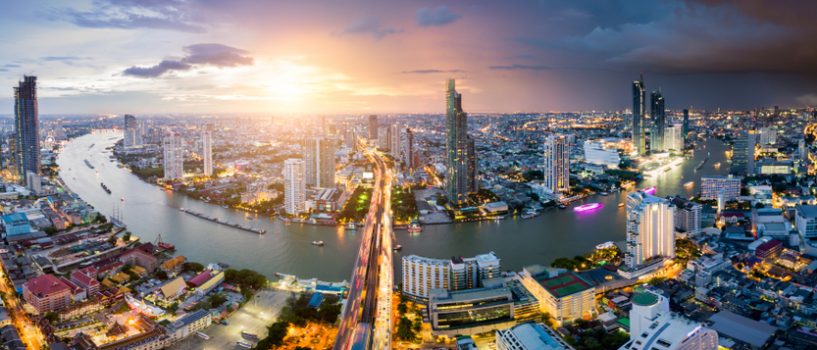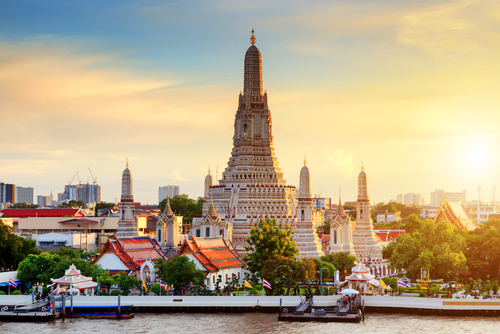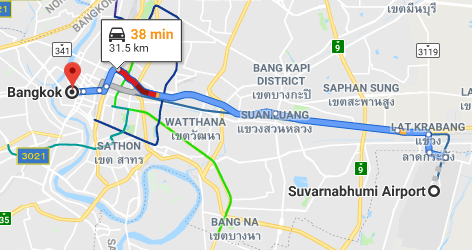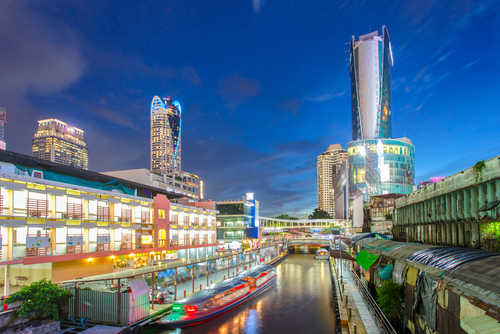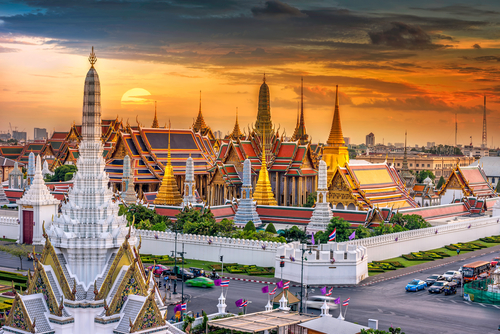With more than 20 million visitors per year, Bangkok is one of the world’s most visited tourist destinations. Its Buddhist temples and beautiful palaces are the city’s main cultural attractions whilst its colourful markets and lively nightlife add to its appeal. Bangkok is a hub for travellers visiting countries throughout South-East Asia as well as serving as an important global business centre. This diverse visitor profile is reflected in the accommodation on offer which ranges from some magnificent 5-star hotels overlooking the Chao Phraya River to the plethora of budget hostels along Khao San Road.
Whilst Bangkok is an all year round destination it is generally agreed that November and December are the best months to visit as the city is dry and a little cooler than average. On the other hand, some visitors actually prefer to visit during the monsoon season in July and August as there are less tourists and some good accommodation deals to be had. The Christmas and New Year period are always busy whilst mid-April attracts huge crowds for the Songkran Festival which celebrates the Buddhist New Year.
Arriving in Bangkok
Bangkok Airports: Suvarnabhumi International Airport is Bangkok’s main airport. It lies approximately 30km east of downtown Bangkok and handles more than 60 million passengers per year. The airport serves as a hub for Thai Airways and Bangkok Airways as well as welcoming national carriers from all over the world including London, Paris, Amsterdam and Frankfurt. Before Suvarnabhumi was opened in 2006 international flights arrived at Don Mueang Airport which lies 25km north-east of the city centre. Today it serves as a hub for low-cost regional operators such as Thai AirAsia, Thai Lion Air and Nok Air.
Suvarnabhumi Airport Transfers: Travellers can get into Bangkok in 30 minutes by means of the Bangkok Airport Rail Link which runs from the airport to Phayathai Station in the downtown area. The service connects with the Bangkok Mass Transit System (BTS) – better known as the ‘Skytrain’ – at Phayathai Station and the Metropolitan Rapid Transit (MRT) at Makkasan Station. If you’re planning on taking a taxi into the city be careful of anyone who approaches you in the arrivals area. Illegal taxi drivers and tour guides are known to operate here and tired tourists can make for easy prey.
Far more convenient and offering complete peace of mind is a private transfer from Bangkok’s Suvarnabhumi Airport. Your driver will be waiting for you on arrival, ready to transport you to your city centre accommodation or to other popular tourist destinations such as Pattaya or Hua Hin. Passengers arriving at Don Mueang Airport on regional flights can also book private transfers with Shuttledirect.
Getting Around: Nowadays it’s remarkably easy to get around this congested city thanks to the Bangkok Mass Transit System (BTS). More commonly referred to as the Skytrain, this system has 43 stations and almost 50km of track. It is made up of the Sukhumvit Line, which goes from the north of the city to the south-east, and the Silom Line which runs to the south and west. A good frame of reference is Siam station as this is where the two lines intersect. The network is very well designed for tourists as it provides easy access to many of the main sights as well as providing convenient transport for visitors who are staying some distance from the city centre.
The Skytrain also connects with the Bangkok Mass Rapid Transit (MRT) network at Sala Daeng Station on the Silom Line and Asok Station on the Sukhumvit Line. This underground system has a total of 35 stations on 45km of track serving the central and north-west parts of the city on two lines. It is also convenient for visiting a number of the city’s top attractions.
Metered taxis are widely available and are generally good value but you can find yourself sitting in traffic jams for what feels like an eternity. Although few drivers speak English you must ensure that they switch on their meter before beginning a journey so as to avoid the inevitable hassle of agreeing a price on arrival. For short journeys around the centre you might choose to travel by tuk-tuk. You must haggle before getting into a tuk-tuk as quoted prices are highly inflated for tourists. And never trust anything that the tuk-tuk drivers around the Grand Palace and other main sights tell you as they are some of Bangkok’s worst rip-off merchants!
Where to Stay in Bangkok
When visiting a city the size of Bangkok it can be a fairly daunting task trying to choose a suitable hotel. Booking.com currently list almost 3000 properties to choose from. The best way to find your ideal accommodation is to decide on your budget then consider the city in terms of different neighbourhoods. Here are some of the most popular places to stay for visitors to Bangkok:
Khao San Road: Lying just a short walk from the Grand Palace this area is backpacker heaven. It is packed with cheap hostels, shops aimed at travellers and many lively bars and restaurants. Definitely the place for budget accommodation.
Pratunam: This busy part of town is best known as home to Pratunam Market which is the city’s largest wholesale market. Travellers are welcome to wander around its many stalls and to try to bargain for a good deal on the many goods on offer. This is another central location where you can find cheap places to stay.
Siam: More appealing to travellers without a budget constraint is the nearby neighbourhood of Siam which is generally considered to be an upmarket shopping and entertainment district. It’s a family-friendly district which is home to a number of luxurious 5-star hotels such as the Siam Kempinski and the Pathumwan Princess. There are also plenty excellent restaurants in the vicinity and the location of the Siam BTS station ensures easy access to other parts of the city.
Silom: This business district is home to the headquarters of some of Thailand’s wealthiest companies and is well connected thanks to its BTS Skytrain station. As well as having some of the city’s stand-out restaurants it also offers proximity to lively nightlife of Patpong. This is a popular place to stay for visiting business people who will find a wide choice of places to choose from including some excellent 5-star properties such as the lebua at State Tower (check out its rooftop bar), the Banyan Tree and Le Meridien Bangkok.
Riverside: The Grand Palace and some of the city’s most famous temples stand close to the banks of the Chao Phraya River. In addition, this riverside location has attracted some of Bangkok’s finest hotels including the Mandarin Oriental, the Peninsula Bangkok and the Shangri-La Hotel. This is very much the place of choice for wealthy travellers and their families and certainly not a place to look for budget accommodation.
Sukhumvit: Sukhumvit Road runs from the centre of Bangkok almost to the Cambodian border (488km). The inner city stretch is largely a commercial area which has plenty accommodation options together with restaurants, nightclubs and shopping malls. Although some hotels along its length are a long way out of the city centre the Skytrain (BTS) makes transport easy and fast. There are plenty properties to choose from ranging from budget hostels to luxurious chain hotels such as the Radisson Blu Plaza, the JW Marriot, and the Sofitel Bangkok. The area is suitable for both business and leisure travellers alike.
Tourist Attractions in Bangkok
First time visitors to Bangkok who are looking to enjoy the cultural attractions will be overwhelmed by the beauty of its temples and palaces. Shopaholics will love bargaining their way around the city’s traditional markets and visiting one of the nearby floating markets. The city is also famous for its nightlife especially its infamous red-light districts. Here are some of the main attractions:
Grand Palace: Built in the late 18th century as the official residence of the nation’s monarch this spectacular palace is the city’s most visited attraction. It is an extensive complex made up of many beautiful buildings, courtyards and gardens. Probably the most popular sight within the grounds is Wat Phra Kaew which is better known as the Temple of the Emerald Buddha. This is regarded as Thailand’s most sacred Buddhist temple.
Wat Pho: Standing just outside the grounds of the Grand Palace to the south this is Bangkok’s oldest temple. Whilst the site is home to a vast number of statues of Buddha the most famous is the golden reclining Buddha which stands 15 metres high and 46 metres long. The temple complex is also known to be the birthplace of traditional Thai massage and is home to the College of Traditional Medicine. Wat Arun: Just across the river from the entrance to Wat Pho and accessible by ferry this attraction is better known as the Temple of Dawn. It is one of Thailand’s most iconic sights thanks to the stunning silhouette its spires generate on the city skyline as the sun rises. Visitors can climb to the top of the spire in the evening to catch a stunning view of the sunset over the Chao Praya River.
Traveller Warning: These attractions get very crowded so it’s strongly recommended that you visit as early in the day as possible. The Grand Palace is the place to start, it opens every day of the week at 8.30am. Do not believe the tuk-tuk drivers who tell you that the palace or temples are closed, they are trying to get you on board so that they can take you to a shop somewhere and earn a commission! This scam has been going on for many years and still succeeds in convincing a significant number of tourists that they can’t visit these magnificent buildings during their stay.
Markets: Visitors should make a point of trying to visit the city’s Chinatown which pretty much stands as a city within a city. Open during the day and at night the area is filled with shops and stalls selling everything from gold jewellery to dried seafood. The early evening is a particularly fun time to visit when the pop-up restaurants start serving some of the city’s finest street food. If you happen to be in town on a weekend you should visit the enormous Chatuchak Weekend Market which is the country’s largest market with more than 15,000 stalls. It can be easily reached by public transport using either the Skytrain (BTS) or the Subway (MRT).
Red-Light Districts: Prostitution has been illegal in Thailand since 1960 yet remains a favourite destination for sex tourism. Visitors who are simply curious to see one of the red-light districts should head for Patpong which has plenty Go-Go bars but also regular drinking bars and restaurants. It also hosts a lively night market which is usually packed with foreign tourists buying souvenirs and knock-off designer clothing. The other main red-light districts include Soi Cowboy and Nana Plaza.
Best Day Excursions from Bangkok
Damnoen Saduak Floating Market: The most popular excursion from Bangkok is to the floating markets of Damnoen Saduak which take place approximately 100km to the west of the city. Most tour buses depart from Bangkok at around 7.00am and transfer visitors to a pier where long-tail boats are awaiting their arrival. You then take a short journey along the river before arriving at the floating market where you’ll see countless wooden vessels filled with all kinds of fresh produce. With all the colour and frenetic activity of the market this is one of the most photogenic travel experiences you could ever imagine. You shouldn’t be put off taking this half-day trip because of the number of tourists who visit Damnoen Saduak. However, there are other floating markets which seem a little more authentic such as the ones at Amphawa and Taling Chan.
Ancient Capital of Ayutthaya: Some 80km north of Bangkok is the UNESCO World Heritage Site of Ayutthaya which was the ancient capital of the Kingdom of Siam from 1350 to 1767. The city is home to a magnificent selection of temples and palaces which lie a fair distance apart. The best way to get around is by renting a bike or hiring a tuk-tuk driver for a few hours at a pre-arranged price. You can get to Ayutthaya by train from Bangkok’s Hualamphong Train Station or by bus from the city’s Northern Bus Terminal. Alternatively, you can book a full-day tour which takes you to Ayutthaya by coach, provides guided tours of the main sights then allows you to slowly cruise back to Bangkok along the Chao Phraya River by riverboat.
Bridge On the River Kwai : The epic 1957 war film called the ‘Bridge on the River Kwai’ starring Alec Guinness told the story of the building of the Burma Railway during the Second World War. It is based on the events of 1943 when Allied prisoners of war were ordered by their Japanese captors to build a bridge over the River Kwai to provide a rail link between Bangkok and Rangoon. An estimated 13,000 POWs and as many as 100,000 civilians died whilst building the ‘Death Railway’ and were buried alongside it. Nowadays tourists can visit the Bridge over the River Kwai which is located 125km west of downtown Bangkok in the town of Kanchanaburi. Independent travellers can travel by train to Kanchanaburi from Bangkok’s Thonburi station. Alternatively, you can join a full-day tour from Bangkok which includes return coach transfers, a speedboat trip along the Mae Klong River and a short train ride along ‘Death Railway’.
About Shuttle Direct
Shuttle Direct is the most established and respected airport transfer provider in Europe and northern Africa. Our friendly local drivers will ensure your safe, economical, and convenient passage to and from the cruise terminal, airport, or major train station of your choice with a minimum of fuss. Book your transfer with our easy to use online booking system and leave the rest up to us!


